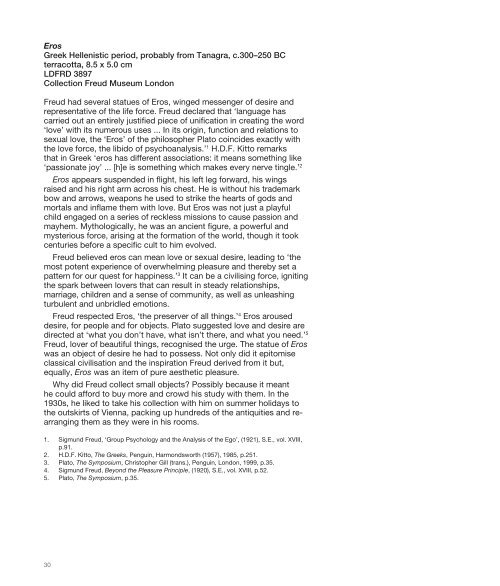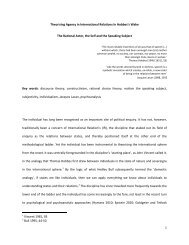sigmund freud's collection an archaeology of the mind
sigmund freud's collection an archaeology of the mind
sigmund freud's collection an archaeology of the mind
You also want an ePaper? Increase the reach of your titles
YUMPU automatically turns print PDFs into web optimized ePapers that Google loves.
Eros<br />
Greek Hellenistic period, probably from T<strong>an</strong>agra, c.300–250 BC<br />
terracotta, 8.5 x 5.0 cm<br />
LDFRD 3897<br />
Collection Freud Museum London<br />
Freud had several statues <strong>of</strong> Eros, winged messenger <strong>of</strong> desire <strong>an</strong>d<br />
representative <strong>of</strong> <strong>the</strong> life force. Freud declared that ‘l<strong>an</strong>guage has<br />
carried out <strong>an</strong> entirely justifi ed piece <strong>of</strong> unifi cation in creating <strong>the</strong> word<br />
‘love’ with its numerous uses ... In its origin, function <strong>an</strong>d relations to<br />
sexual love, <strong>the</strong> ‘Eros’ <strong>of</strong> <strong>the</strong> philosopher Plato coincides exactly with<br />
<strong>the</strong> love force, <strong>the</strong> libido <strong>of</strong> psycho<strong>an</strong>alysis.’ 1 H.D.F. Kitto remarks<br />
that in Greek ‘eros has different associations: it me<strong>an</strong>s something like<br />
‘passionate joy’ ... [h]e is something which makes every nerve tingle.’ 2<br />
Eros appears suspended in fl ight, his left leg forward, his wings<br />
raised <strong>an</strong>d his right arm across his chest. He is without his trademark<br />
bow <strong>an</strong>d arrows, weapons he used to strike <strong>the</strong> hearts <strong>of</strong> gods <strong>an</strong>d<br />
mortals <strong>an</strong>d infl ame <strong>the</strong>m with love. But Eros was not just a playful<br />
child engaged on a series <strong>of</strong> reckless missions to cause passion <strong>an</strong>d<br />
mayhem. Mythologically, he was <strong>an</strong> <strong>an</strong>cient fi gure, a powerful <strong>an</strong>d<br />
mysterious force, arising at <strong>the</strong> formation <strong>of</strong> <strong>the</strong> world, though it took<br />
centuries before a specifi c cult to him evolved.<br />
Freud believed eros c<strong>an</strong> me<strong>an</strong> love or sexual desire, leading to ‘<strong>the</strong><br />
most potent experience <strong>of</strong> overwhelming pleasure <strong>an</strong>d <strong>the</strong>reby set a<br />
pattern for our quest for happiness.’ 3 It c<strong>an</strong> be a civilising force, igniting<br />
<strong>the</strong> spark between lovers that c<strong>an</strong> result in steady relationships,<br />
marriage, children <strong>an</strong>d a sense <strong>of</strong> community, as well as unleashing<br />
turbulent <strong>an</strong>d unbridled emotions.<br />
Freud respected Eros, ‘<strong>the</strong> preserver <strong>of</strong> all things.’ 4 Eros aroused<br />
desire, for people <strong>an</strong>d for objects. Plato suggested love <strong>an</strong>d desire are<br />
directed at ‘what you don’t have, what isn’t <strong>the</strong>re, <strong>an</strong>d what you need.’ 5<br />
Freud, lover <strong>of</strong> beautiful things, recognised <strong>the</strong> urge. The statue <strong>of</strong> Eros<br />
was <strong>an</strong> object <strong>of</strong> desire he had to possess. Not only did it epitomise<br />
classical civilisation <strong>an</strong>d <strong>the</strong> inspiration Freud derived from it but,<br />
equally, Eros was <strong>an</strong> item <strong>of</strong> pure aes<strong>the</strong>tic pleasure.<br />
Why did Freud collect small objects? Possibly because it me<strong>an</strong>t<br />
he could afford to buy more <strong>an</strong>d crowd his study with <strong>the</strong>m. In <strong>the</strong><br />
1930s, he liked to take his <strong>collection</strong> with him on summer holidays to<br />
<strong>the</strong> outskirts <strong>of</strong> Vienna, packing up hundreds <strong>of</strong> <strong>the</strong> <strong>an</strong>tiquities <strong>an</strong>d rearr<strong>an</strong>ging<br />
<strong>the</strong>m as <strong>the</strong>y were in his rooms.<br />
1. Sigmund Freud, ‘Group Psychology <strong>an</strong>d <strong>the</strong> Analysis <strong>of</strong> <strong>the</strong> Ego’, (1921), S.E., vol. XVIII,<br />
p.91.<br />
2. H.D.F. Kitto, The Greeks, Penguin, Harmondsworth (1957), 1985, p.251.<br />
3. Plato, The Symposium, Christopher Gill (tr<strong>an</strong>s.), Penguin, London, 1999, p.35.<br />
4. Sigmund Freud, Beyond <strong>the</strong> Pleasure Principle, (1920), S.E., vol. XVIII, p.52.<br />
5. Plato, The Symposium, p.35.<br />
30

















